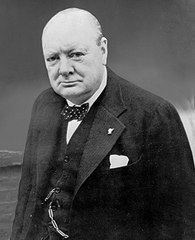Politician, statesman, military officer, historian and writer, Winston Churchill is one of the most influential figures in modern history. He is most renowned for his leadership of Britain during World War II, when his famed oratory and steadfast defiance to tyranny helped inspire Britain and its allies to victory.
Winston Churchill
Winston Leonard Spencer Churchill, born in 1874, graduated from military college in 1894 and spent six years in the military, traveling to such remote locales as Cuba, India, South Africa and Sudan. He became a Member of Parliament in 1900, beginning a political career that would consume most of his adult life.
He was named First Lord of the Admiralty before World War I, but he was forced to resign after being blamed for the failure of the Gallipoli landings. He briefly served time on the Western Front before returning to politics.
In the 1920s, Churchill served as Chancellor of the Exchequer and oversaw a period of economic downturn. In the 1930s, he lost much of his influence in Parliament as he broke with his Conservative Party colleagues over his opposition to Indian self-rule and his support of King Edward VIII. This period for him would become known as “the wilderness years.”
During the ‘30s, Churchill frequently warned of the looming danger of Adolf Hitler and Nazi Germany, and criticized the government of Neville Chamberlain for being too weak. In 1940, as the Nazis swept through Western Europe, Chamberlain resigned and Churchill was chosen to succeed him as prime minister and lead Britain through the war.
Sources in This Story
- Encyclopaedia Brittanica: Sir Winston Churchill
- The New York Times: Churchill is Dead at 90; The World Mourns Him; State Funeral Saturday
- The New York Times: Churchill Dies at 90 at Home in London
- Nobelprize.org: Winston Churchill—Biographical
The New York Times’ obituary of Churchill, which described him as “one of the greatest men of his time,” praised his wartime oratory in inspiring Britain to stand up to Nazi forces and said that his “paramount place in history is as the man chiefly responsible for providing the leadership and insuring the cohesion of the three great wartime allies.”
After the war, Churchill’s party was defeated in parliamentary elections and he became Leader of the Opposition. Just as he warned of the Nazi threat in the 1930s, he spoke out against the threat of communism at a when the Soviet Union was still considered an ally, most famously at his “Iron Curtain” speech in 1946.
Churchill served one more term as prime minister in 1951-1955, and remained as an MP until October 1964, just three months before his death. He had a number of small strokes in the 1950s and ‘60s and suffered with depression, which he called the “black dog,” as his health waned and he lost political authority. He died on January 24, 1965, at age 90, nine days after suffering a severe stroke.
In addition to his political career, Churchill was also a prolific author and the winner of the 1953 Nobel Prize for Literature He is also remembered for his wit, tenacity and larger than life personality. “He was a great personality, not just a great statesman. He was human, with emotions and desires and faults, some on an Olympian scale,” wrote the Times.











